Our Roots Are Still Alive - Chapter 11
Previous: Chapter 10
Table of Contents
Next: Chapter 12
New Jersey Solidarity-Activists for the Liberation of Palestine Main Site
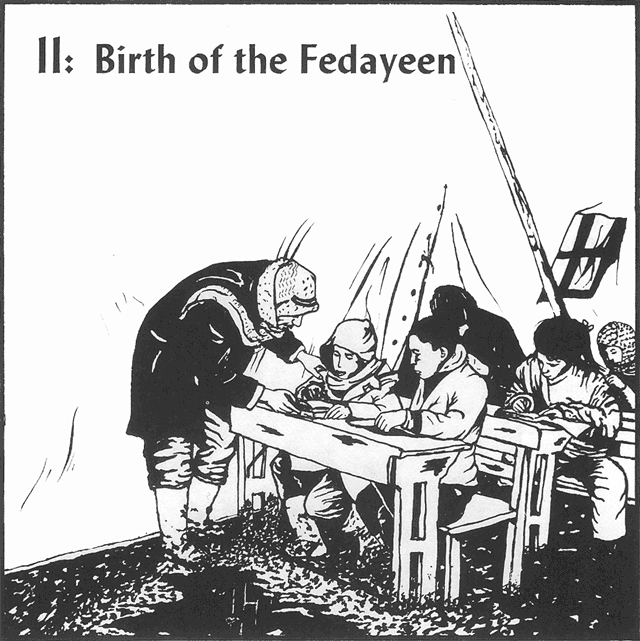
- Let me tell you why these people fight. It's because of their condition. I believe that if you would stay in a camp for one week, you would feel that you had to fight your father, not to speak of fighting Israel.
- Inam Yasin, Priest from Nazareth
When a tree is uprooted, the ground around the tree cracks open. Like the uprooting of a tree, the exile of the Palestinian people and the implanting of Israel on Arab land shook the surrounding Arab countries. In 1952 an officers' coup in Egypt overthrew the corrupt rule of King Farouk. Within two years, Gamal Abdel Nasser emerged as the dynamic nationalist leader of Egypt. He promised to end the misery of the peasants by breaking up large landholdings and giving land to those who tilled it. He also pledged to expel the British from Egyptian soil and to fight the Zionist occupation of Palestine.
In Syria the Ba'ath Party, under the slogan "Unity, Freedom and Socialism," took power in 1954. It united with the Communist Party of Syria, the largest communist organization in the Middle East, to form a new government. From Cairo and Damascus to the smallest village along the Nile, Egyptians and Syrians debated the future direction of their countries. Newspapers and wall posters attacked the United States and Britain, as well as the Zionists and rich Arab landowners who served colonialism.
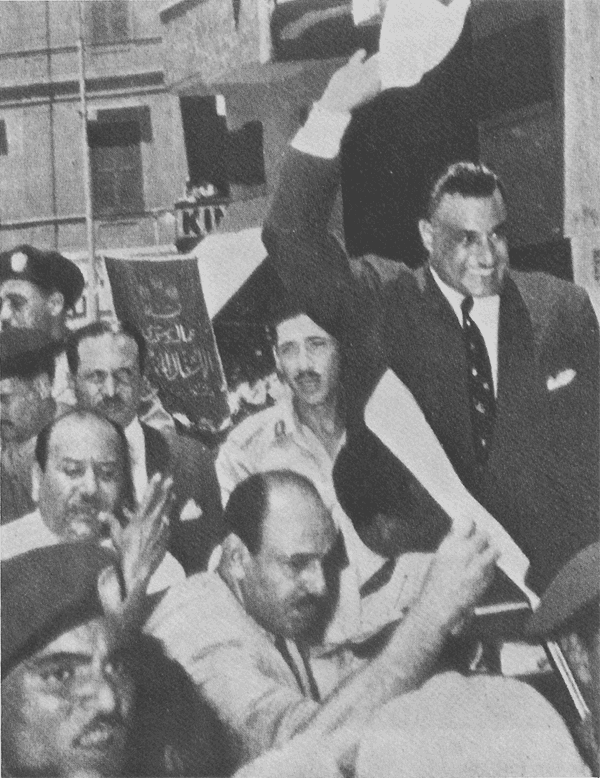
Gamal Nasser was acclaimed in Cairo after he announced the nationalization of the Suez Canal.
The Western powers were alarmed. Loss of their economic control over Egypt and Syria loomed dangerously on the horizon. The new governments' embrace of "socialism" could mean an opening to Soviet influence in the Middle East. The United States and Britain did not want that. When Nasser surprised the United States by asking for American aid and arms, U.S. officials told him he would first have to join a military alliance to "contain" communist influence in the Middle East. Nasser refused. He insisted that Egypt wanted a neutralist foreign policy - no military alliance with either the socialist or the capitalist camp.
The American Secretary of State John Foster Dulles refused to concede that there was such a position as neutralism. To him, countries had to be either for the United States or for the Soviet Union, for capitalism or for socialism. For Dulles and the oil companies he had represented as a corporate lawyer, the Middle East was a giant pool of oil to be guarded for U.S. corporations. Their major concern was that some countries and leaders who weren't firm enough allies of the United States might eventually turn toward socialism and claim their oil for themselves. Dulles thought that Nasser's neutralism was the beginning of an alliance with the Soviet Union and a threat to U.S. power in the area.
Israel, too, was concerned about Nasser and the upsurge of Arab nationalism. Six years after the 1948 war, none of the Arab countries - including those like Jordan and Saudi Arabia which were ruled by conservative regimes - had yet recognized Israel. The Arab boycott of Israel was hurting its economy badly. Unless there was a breakthrough soon, Israel's economic problems would get worse. Already, immigration had practically fallen to zero. Some way had to be found to gain Arab recognition and trade.
Ben-Gurion believed that Arabs - and particularly the new wave of Arab nationalists - understood only force. Ben-Gurion believed that the time was at hand for Israel to play the role of watchdog. When Nasser stepped out of line, Israel would punish him. If, in attacking Egypt, Israel could expand its territory, so much the better. As Ben-Gurion put it, "To maintain the status quo will not do. We have set up a dynamic state bent on expansion."1
War in Suez
In early February 1955, the Egyptian government tried and hanged three Israeli intelligence agents in Cairo for acts of terrorism. On February 28, Israeli troops attacked a camp in the Gaza Strip and killed thirty-six Egyptian soldiers. The United Nations condemned the raid, pointing out that there had been no Egyptian border crossing or other military act providing even a pretext for the raid. Furious, Nasser asked the United States for arms to defend Egypt against further attacks. The United States responded with one condition: first Egypt had to join the Baghdad Pact, the anti-Soviet military alliance the United States had set up with client states in the area.
Nasser defied both the United States and Israel. For years, Palestinians living in the Gaza had been asking for military training and arms from the Egyptian government. After Israel's raid, Nasser approved their request. During 1955 small bands of Palestinians began crossing the border to attack Israeli patrols and border settlements. They called themselves fedayeen - "people of sacrifice."
Egypt also moved to defend itself against further attack. Nasser negotiated with Czechoslovakia to get the arms Egypt needed. Secretary of State Dulles flew to Cairo to convince Nasser he was falling into "communist hands" by buying arms from the Czechs. Nasser ignored Dulles's pleas. In July of 1956, the United States withdrew its promise of aid to help build the Aswan Dam. The dam was vital to Egypt's development; it would provide irrigation for the 75 percent of Egypt which was desert. Britain and France applauded this American show of power.
But Nasser would not be intimidated. On July 26, 1956, he nationalized the Suez Canal, a part of Egypt formerly controlled by Britain. Over one hundred twenty-five thousand Egyptians had died building the canal for the British Empire. Now the income from ships using the canal would benefit the Egyptian people by financing the dam that would irrigate the desert.
Telegrams and letters flew between the leaders of Europe and the United States. Britain and France urged immediate military intervention. Britain wanted to regain a foothold in its former colony. France wanted Nasser defeated because it was convinced that he was masterminding the revolution in Algeria, France's North African colony. However, President Dwight Eisenhower preferred the more subtle strategy of economic pressure.
Britain and France did not wait for the United States. Israel was eager to ally itself with the West and to expand into Egypt. In October 1956, under a secret agreement with Britain and France, Israel invaded the Egyptian Sinai and the Gaza Strip. Israeli troops drove as far as the Suez Canal with the help of British and French air and naval cover. Heady with success, Ben-Gurion declared, "We have created the third Kingdom of Israel!"2 His boast was premature.
The Soviet Union feared a return of Western influence in Egypt and was anxious to heighten Soviet prestige in the Middle East. Moscow threatened to use its own military force to stop the invasion. The United States, angry at the independent actions of Britain and France, added its voice to the condemnations. With American and Soviet support, the United Nations General Assembly stopped the invasion deep inside Egyptian territory. Israel continued to occupy the territory for five months before it reluctantly withdrew. When it left, UN troops were stationed in Gaza and at the Straits of Tiran.
Israel's Suez expedition had bared its aggressive and expansionist face to many peoples of the world, especially in Africa, Asia and Latin America. But the Palestinian people experienced the harsh consequences directly. On the eve of the invasion, the Israeli Army had imposed a curfew on the border town of Kfar Kassem, a Palestinian village inside Israel. The order was announced at 4:30 in the afternoon. Between five and six o'clock that evening, as villagers returned from work unaware of the order, Israeli soldiers murdered thirty-seven Palestinians. The oldest killed was sixty-six; the youngest, a boy of eight. For the death of thirty-seven Palestinians, the commander of the Kfar Kassem operation was fined one Israeli cent.3
In the Gaza Strip, the Israeli occupation had been especially brutal. As the soldiers moved into Gaza, they found a list of fedayeen in an Egyptian administration center. Systematically, they rounded up and executed two hundred fifty young Palestinians. Eighty died in a mass execution in a schoolyard.4
The Summer of Mourning
Still, during the five long months of Israeli occupation, small groups of Palestinians risked their lives to harass the Israeli soldiers. Although Nasser stopped military training of Palestinians in Gaza after the UN troops came in 1956, the seeds of resistance that sprouted in Gaza took root among Palestinians in many Arab countries. Israel had set back the Gaza fedayeen, but the beginnings of an organized movement arose in their place - the national liberation movement of the Palestinian people.
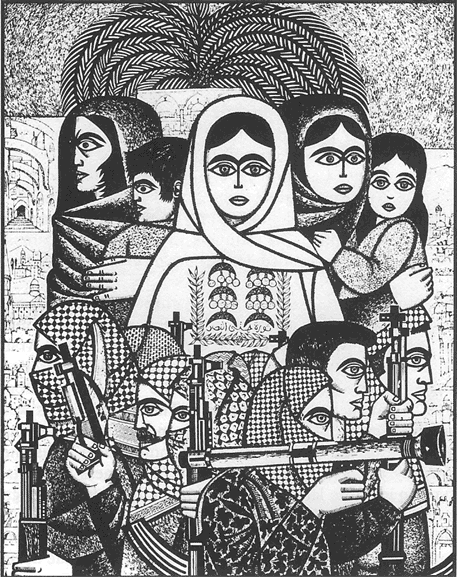
Throughout the fifties exiled Palestinians, from Beirut to small towns in Kuwait, had brought the cause of Palestine to political movements sweeping the Arab countries. In 1953 George Habash, a Palestinian doctor from Lydda, helped to found the Arab Nationalist Movement (ANM) in Jordan. It operated secretly in Jordan, its members subject to death or imprisonment if caught by the king's police. Aboveground in other Arab countries, it agitated for Arab unity against Western imperialism and Zionism. The ANM learned much from its fight against Israel and the West. As one woman said:
- All in all, Dulles and Ike, Eden and MacMillan, Ben-Gurion and Moshe Dayan were not a totally unmitigating evil; they gave us a rude awakening .... They forced us to re-examine the foundations of our society.5
When ANM members took a hard look at Arab society, they quickly understood the betrayal of the Arab kings in the 1948 war. The traditional leaders - kings, sheiks, landowners, businessmen, clergy - all had their own narrow interests at heart and willingly served imperialism. They claimed to represent their people. Yet Saudi Arabian oil workers made twelve cents a day; Jordanian peasants lived from hand to mouth; and Lebanese tenant farmers were thrown off their land and crowded into Beirut, where no work was to be found. Arab leaders spoke emotionally of the plight of the Palestinians, yet threw them into jail in Jordan and refused them passports and work in Lebanon. Thus Palestinians were soon at the forefront of every movement that spoke out for transforming Arab society.
Nasser's defiance over the Suez Canal led many Palestinians to hope that radical changes in the Arab world and liberation for Palestine might happen very soon. Nasser quickly became a near-legendary hero. His pictures were tacked to the walls of the refugee tents and Palestinians grouped around battered radios to hear his speeches that defied the West to conquer Egypt. In 1958, Egypt and Syria merged to form the United Arab Republic. Arab nationalists, who hoped to see one unified Arab nation in the Middle East, were elated. The two countries that most militantly opposed Zionism and the West had united. Palestinians in the schools, camps, oilfields and inside political organizations pushed for a new offensive to recover their homeland.
This rising tide of Arab nationalism did not go unchallenged. As British and French presence in the Middle East waned after the Suez invasion, the United t States emerged as the major imperial power. It was determined to stop radical Arab nationalism. U.S. military bases ringed the Middle East; the Sixth Fleet patrolled the Mediterranean. In 1957 the United States had announced the "Eisenhower Doctrine," a new and more forceful statement of an old policy. The United States was prepared to "contain communism" in the Middle East by any means, including "the employment of the armed forces of the United States." "Communism" was the Americans' general term for any political force hostile to U.S. business interests. The efforts of Egypt and Syria to institute land reform and break the grip of foreign businesses over their economies fell into that category.
Soon after Syria and Egypt formed the United Arab Republic, the faithful servant of the United States and Britain, Nuri es-Said of Iraq, decided to invade Syria and detach it from Egypt. The Iraqi troops, who were influenced by nationalism themselves, refused their orders. Instead, they turned around and marched on Baghdad to overthrow the government of Nuri es-Said. As crowds rejoiced in the Baghdad streets, the Republic of Iraq was proclaimed on July 14, 1958.
The right-wing governments of Lebanon and Jordan also came under attack from. Arab nationalists in those countries. In Lebanon a small-scale civil war erupted in May 1958, when pro-Western President Camille Chamoun tried to run for an unprecedented second term as president. Fighting broke out between his supporters and nationalist opponents. In the Lebanese town of Sour, members of the Arab Nationalist Movement, many of them Palestinians, took over the town government and organized its citizens to defend themselves. The people stormed the prison and police station to free those who had been arrested as "political agitators" by the Lebanese Army. A young Palestinian woman recalled, "That summer I do not remember sleeping a whole night without interruption, for I was a soldier at thirteen and I had sentinel duty."6
On July 16, 1958, two days after the Iraqi people overthrew their government, American Marines landed in Beirut to protect Chamoun's government. Three days later British paratroopers flew to Jordan to shore up King Hussein's regime, which was also under attack from Jordanian nationalists. With Western help, the governments of Jordan and Lebanon remained in power. Western guns had not been able to sever the union of Egypt and Syria. But by the end of 1958, with a major show of force, the United States and Britain had contained the revolutionary thrust of Arab nationalism. For many Arab nationalists, the elation of a year earlier gave way to pessimism about the Arab revolution's future. One Palestinian described the summer of 1958 as a "summer of mourning." But other Palestinians did not despair. They continued to look for the path that would lead to the liberation of Palestine.
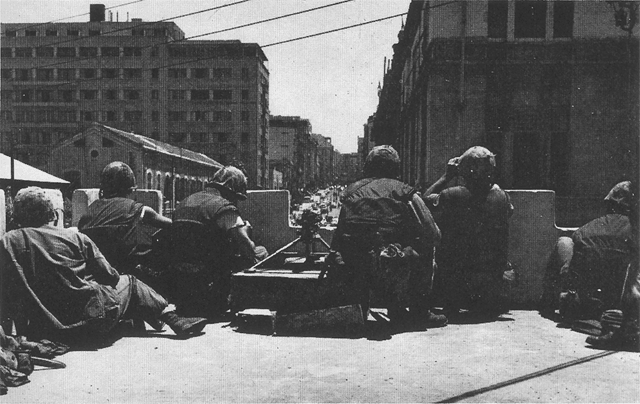 U.S. Marines position machine guns on a Beruit street in 1958.
U.S. Marines position machine guns on a Beruit street in 1958.
The Fedayeen Are Born
Scattered throughout the Arab world, the Palestinians faced the problem of how a small dispersed nation could organize itself to fight for the return to its homeland. For many, the Gaza fedayeen had been an inspiration. The fedayeen had fought Israel while the Arab governments merely talked about it. In 1958 twelve young Palestinians met secretly on a beach in Kuwait to discuss building an independent, armed Palestinian resistance movement - one that would not depend on any Arab government. These Palestinians had been active in student organizations and some had fought in the 1948 war while in their teens. They believed that Palestinians could not rely on the Arab leaders to liberate Palestine, no matter what they might promise. Palestinians had to take their destiny in their own hands. The twelve fighters founded an organization called Fatah, which means "victory" in Arabic. Read backwards, its letters are the initials of the words "Palestine National Liberation Movement."
Fatah's magazine, Falasteenuna, was passed secretly from hand to hand in the Arab cities and refugee camps. It called for Palestinians to leave other Arab organizations and work to build an independent Palestinian movement. It urged Palestinians to prepare to fight to recover their homeland. The guns of imperialism had crushed the 1936 rebellion, and the Zionist army had forced Palestinians from their homes. Now U.S. military might backed up Israel's occupation of Palestine. Fatah argued that, as in 1936, Palestinians had to take up arms against imperialism and its allies.
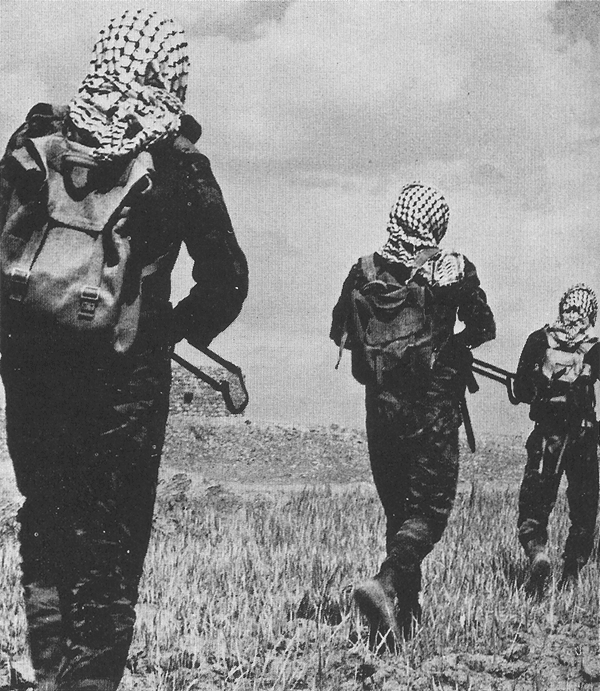
At first only a small number of Palestinians joined Fatah. Many still believed that Nasser would unify the Arab peoples and liberate Palestine. However, Nasser's limits were becoming more evident. In 1961, Syria withdrew from the union with Egypt, and accused Nasser of trying to dominate its economy. The collapse of this attempt at Arab unity lowered Nasser's prestige and heightened the appeal of Fatah's call among Palestinians. By 1963 Nasser was pre-occupied with Egypt's massive economic problems and said that he had "no plans" to liberate Palestine. The constant promises broadcast over Egyptian radio suddenly rang hollow. Fawaz Turki, the Palestinian writer, described the conflict in his family:
- At home there were tense scenes where I would argue mercilessly with my father, ridiculing his naive grasp of Middle Eastern politics, or in desperation, rip Nasser's picture off the wall and spit on it. I did not give the unhappy man the chance to hold on to that symbol of hope he saw in the picture of the smiling face on the wall. In those days of emotional crisis, the last years of his on earth, he had nothing except hope. And he hoped. And a million people hoped.7
In this same period Palestinians in the Arab Nationalist Movement, long disillusioned with Nasser's promises, broke decisively with him. Like Fatah, ANM formed its own guerrilla organization and recruited among students, workers and refugees in the camps. Its members studied together and the vague "socialism" of the early days of the ANM became a more sharply defined Marxism. ANM activists read the works of Marx, Lenin, Ho Chi Minh and Che Guevara, even though in countries like Jordan the penalty for possessing a Marxist book was imprisonment.
Dispersed in all the Arab countries, groups of Palestinians formed cells that began training for the day they would fight Israel. These groups came into existence as other countries in Asia, Africa and Latin America stirred with revolution. Palestinians studied the experiences of the Algerians, who had waged a seven-year battle against French colonialism. They also took lessons and inspiration from the Vietnamese and Cuban peoples' example. They shared the conviction that a people determined to be free from foreign domination could defeat even the most powerful enemies.
The old Palestinian leadership that had misled their people during the 1936 rebellion had been defeated in the 1948 war. Now new leaders arose who had no bank accounts or land-holdings to protect. They were prepared to lead the Palestinians in a people's war - a war that mobilized the resources of all the people and taught, trained and armed all who wanted to fight. In a people's war there would be no compromise with imperialism. The April 15, 1963 issue of Falasteenuna affirmed:
- The Palestinian alone is determined to refuse all colonialist plans .... He is firmly convinced that armed struggle is the one and only means for the return [to Palestine] .... He refuses to allow [the Arab governments] to represent him
in their lethargy, diplomacy and defeatism. As soon as he is able to tear away the fetters with which they had bound him he shall return to being what he
was - a fedayeen.
The idea of the fedayeen, willing to give their lives in people's war, threatened not only Israel, but the established Arab leaders as well. These leaders had always used the Palestinian cause for their own ends, competing with each other in verbal claims of support for the Palestinians. None of them wanted to see an independent Palestinian movement. The Arab leaders called a summit conference in 1964 to try to regain their slipping control of the Palestinians. At Nasser's request, they created a Palestinian organization - the Palestine Liberation Organization (PLO) - to control the guerrilla groups.8 To be head of the PLO, the Arab leaders chose Ahmed Shukeiry, an ambitious and conservative Palestinian lawyer who had served Saudi Arabia as Minister for Palestinian Affairs. Fatah attended the first conference of the PLO in May 1964, but maintained its organizational independence. Other guerrilla groups refused even to attend the conference. Unity between Palestinians would come "within Palestine," not in "offices," Fatah declared.
On January 1, 1965, a Fatah unit launched its first armed attack against Israel. Fatah issued its first communique under the name of its military arm, al-Assifa, "the storm." Like a storm, this first raid stirred the Middle East. Other guerrilla groups soon began their own operations against Israel. With these actions Palestinians had taken the first steps in a people's war against the state of Israel.
Footnotes
- Ben-Gurion, Destiny and Rebirth of Israel, p. 419, cited by Petran, Zionism, p. 13.
- Rodinson, Israel and the Arabs, p. 76.
- Jiryis, The Arabs in Israel, pp. 96-113.
- Abdullah Schleifer, The Fall of Jerusalem, p. 62.
- Leila Khaled, My People Shall Live (Toronto: 1975), p. 40.
- Ibid., p. 47.
- Turki, The Disinherited, p. 60.
- Schleifer, pp. 69-71 and Khaled, p. 83.